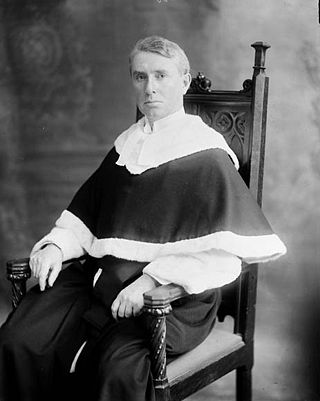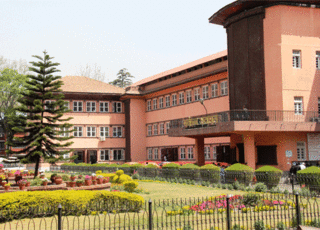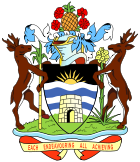
The politics of Antigua and Barbuda takes place in a framework of a unitary parliamentary representative democratic monarchy, wherein the sovereign of Antigua and Barbuda is the head of state, appointing a governor-general to act as vice-regal representative in the nation. A prime minister is appointed by the governor-general as the head of government, and of a multi-party system; the prime minister advises the governor-general on the appointment of a Council of Ministers. Executive power is exercised by the government. Legislative power is vested in both the government and the two chambers of the Parliament. The bicameral Parliament consists of the Senate and the House of Representatives.
Antigua and Barbuda's transport systems include both public and privately run services. Roads in the country are paved and follow a winding and gently sloping course connecting parishes to villages and communities. Driving is on the left-hand side. The speed limit is set at 40 mph, Traffic signs posted throughout main roads in Antigua and Barbuda allow for ease of commute, and with GPS coordinates posted throughout the country, the process of navigation has become even easier.

A justice of the peace is a judicial officer of a lower or puisne court, elected or appointed by means of a commission to keep the peace. In past centuries the term commissioner of the peace was often used with the same meaning. Depending on the jurisdiction, such justices dispense summary justice or merely deal with local administrative applications in common law jurisdictions. Justices of the peace are appointed or elected from the citizens of the jurisdiction in which they serve, and are usually not required to have any formal legal education in order to qualify for the office. Some jurisdictions have varying forms of training for JPs.

The term magistrate is used in a variety of systems of governments and laws to refer to a civilian officer who administers the law. In ancient Rome, a magistratus was one of the highest ranking government officers, and possessed both judicial and executive powers. In other parts of the world, such as China, magistrate is a word applied to a person responsible for administration over a particular geographic area. Today, in some jurisdictions, a magistrate is a judicial officer who hears cases in a lower court, and typically deals with more minor or preliminary matters. In other jurisdictions, magistrates are typically trained volunteers appointed to deal with criminal and civil matters in their local areas.

The Supreme Court of Nepal is the highest court in Nepal. It has appellate jurisdiction over decisions of the seven High Courts and extraordinary original jurisdiction. The court consists of twenty Justices and one Chief Justice.

The Delaware Court of Chancery is a court of equity in the American state of Delaware. It is one of Delaware's three constitutional courts, along with the Supreme Court and Superior Court. Since 2018, the court consists of seven judges. The court is known for being a hub for corporate governance litigation in the United States, as two-thirds of Fortune 500 companies are incorporated in Delaware.

The High Court of Singapore is the lower division of the Supreme Court of Singapore, the upper division being the Court of Appeal. The High Court consists of the chief justice and the judges of the High Court. Judicial Commissioners are often appointed to assist with the Court's caseload. There are two specialist commercial courts, the Admiralty Court and the Intellectual Property Court, and a number of judges are designated to hear arbitration-related matters. In 2015, the Singapore International Commercial Court was established as part of the Supreme Court of Singapore, and is a division of the High Court. The other divisions of the high court are the General Division, the Appellate Division, and the Family Division. The seat of the High Court is the Supreme Court Building.

The House of Representatives of Antigua and Barbuda is the lower chamber of the country's bicameral parliament. Each of the constituencies created in accordance with section 62 of the Constitution shall elect one representative to the House in a direct election in accordance with the procedures specified by or pursuant to any law, subject to the rules of this Constitution. Unless he is prohibited by law from registration as a voter for the purpose of electing a member of the House, every Commonwealth citizen who is eighteen years of age or older and who meets the requirements relating to residence or domicile in Antigua and Barbuda as prescribed by Parliament is entitled to be registered as such a voter in accordance with the provisions of any law in that regard, and no other person may be registered. Every person who is registered to vote in any constituency shall, unless prohibited from doing so by any law, be entitled to vote in accordance with the provisions of any law in that regard in any election of members of the House in that constituency. Voting is free and must be done by secret ballot in accordance with any rules that Parliament may impose during House member elections.
In law, rendition is a "surrender" or "handing over" of persons or property, particularly from one jurisdiction to another. For criminal suspects, extradition is the most common type of rendition. Rendition can also be seen as the act of handing over, after the request for extradition has taken place.

The Supreme Court is the highest court in the Kingdom of Spain. Originally established pursuant to Title V of the Constitution of 1812 to replace —in all matters that affected justice— the System of Councils, and currently regulated by Title VI of the Constitution of 1978, it has original jurisdiction over cases against high-ranking officials of the Kingdom and over cases regarding illegalization of political parties. It also has ultimate appellate jurisdiction over all cases. The Court has the power of judicial review, except for the judicial revision on constitutional matters, reserved to the Constitutional Court.
The law of the Republic of China as applied in Taiwan, Penghu, Kinmen and Matsu is based on civil law with its origins in the modern Japanese and German legal systems. The main body of laws are codified into the Six Codes:

The Judiciary of Barbados is an independent branch of the Barbadian government, subject only to the Barbadian Constitution. It is headed by the Chief Justice of Barbados. Barbados is a common law jurisdiction, in which precedents from English law and British Commonwealth tradition may be taken into account.
In 1964 Tanganyika and Zanzibar formed the United Republic of Tanzania. After the Treaty of the Union, the two countries continued to remain with their own legal systems including court structures. In the 1977 Constitution of the United Republic of Tanzania, the High Court of Tanganyika whose jurisdiction was and still is territoriality limited to Tanzania Mainland was called the High Court of Tanzania and the High Court of Zanzibar retained its original name. It is essential to note that the High Court of Tanzania only has territorial jurisdiction over legal issues arising in Tanzania Mainland and the High Court of Zanzibar has territorial jurisdiction over legal issues arising in Zanzibar.
The Constitution of Jammu and Kashmir was the legal Constitution which established the framework for the state government of the Indian state of Jammu and Kashmir. The constitution was adopted on 17 November 1956, and came into effect on 26 January 1957. It was rendered infructuous on 5 August 2019 by an order signed by the President of India and ceased to be applicable on that date. It also included Ladakh.

The Code of Criminal Procedure commonly called Criminal Procedure Code (CrPC) is the main legislation on procedure for administration of substantive criminal law in India. It was enacted in 1973 and came into force on 1 April 1974. It provides the machinery for the investigation of crime, apprehension of suspected criminals, collection of evidence, determination of guilt or innocence of the accused person and the determination of punishment of the guilty. It also deals with public nuisance, prevention of offences and maintenance of wife, child and parents.

The Marshall Court (1801–1835) heard forty-one criminal law cases, slightly more than one per year. Among such cases are United States v. Simms (1803), United States v. More (1805), Ex parte Bollman (1807), United States v. Hudson (1812), Cohens v. Virginia (1821), United States v. Perez (1824), Worcester v. Georgia (1832), and United States v. Wilson (1833).

The Crimes Act of 1790, formally titled An Act for the Punishment of Certain Crimes Against the United States, defined some of the first federal crimes in the United States and expanded on the criminal procedure provisions of the Judiciary Act of 1789. The Crimes Act was a "comprehensive statute defining an impressive variety of federal crimes".

The Constitution of Antigua and Barbuda is the supreme law that governs the country. The Constitution lays out the legal foundation for the Antigua and Barbuda government as well as the rights and obligations of the general public and other public servants. In 1981, the Constitution went into effect. The Antigua Constitution and Elections Order, as well as the Constitution of the Associated State of Antigua, are among the texts pertaining to Antigua and Barbuda's governance that have been superseded by the 1981 document.
The Judiciary of Sri Lanka are the civil and criminal courts responsible for the administration of justice in Sri Lanka. The Constitution of Sri Lanka defines courts as independent institutions within the traditional framework of checks and balances. They apply Sri Lankan Law which is an amalgam of English common law, Roman-Dutch civil law and Customary Law; and are established under the Judicature Act No 02 of 1978 of the Parliament of Sri Lanka.

The judiciary of British Virgin Islands is based on the judiciary of the United Kingdom. The British Virgin Islands is a member state of the Eastern Caribbean Supreme Court. The courts are organized at four levels, including the provision for final appeal to the Judicial Committee of the Privy Council in London.













